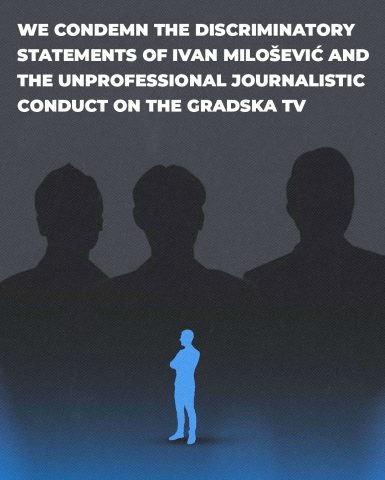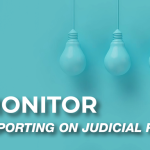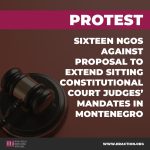
CONSTITUTIONAL COURT OVERTURNS HIGH COURT RULING ON ILL-TREATMENT IN PRISON, CITING SUSPENDED SENTENCES FOR TORTURE
21/03/2025INITIATIVE BY 101 CSOS AGAINST AMENDMENTS TO MEDIA LAWS AIMED AT ESTABLISHING POLITICAL CONTROL OVER RTCG AND THE AGENCY FOR AVM SERVICES
31/03/2025WE CONDEMN THE DISCRIMINATORY STATEMENTS OF IVAN MILOŠEVIĆ AND THE UNPROFESSIONAL JOURNALISTIC CONDUCT ON THE GRADSKA TV

We strongly protest the statement by the Secretary of the Journalists’ Association of Montenegro, Ivan Milošević, who said that “it is somewhat inappropriate for a country with 74% Orthodox population to have a representative of a national minority lead foreign policy”.
It is Milošević’s statement that is inappropriate and unacceptable. Not only does it fail to distinguish between religion and nationality, but it also suggests that religious affiliation should be a prerequisite for holding a public office in a secular state such as Montenegro. Milošević’s position is, in fact, discriminatory, nationalistic, and undermines the foundations of a civic society.
We strongly oppose such fascist-leaning views and will not allow them to become normalized in the public sphere. We remind that national or ethnic affiliation, religion or atheism, disability, sexual identity, and other personal characteristics should not and must not be criteria for holding public office. The only acceptable criteria are those prescribed by law and the Constitution, which explicitly prohibit any form of discrimination.
We particularly protest the passive behaviour of the host of the show, journalist Radomir Tešanović from Gradska TV, who failed to respond to this statement, thereby giving the impression of approval. This is a violation of Principle 4 of the Journalists’ Code of Montenegro, which stipulates that religion, nationality, race, or any other affiliation should only be mentioned if necessary for a complete public interest report and that journalists are obliged to respect members of other nations.
We also remind that Gradska TV is a public service funded by the budget of the Capital City of Podgorica, to which all citizens contribute – both believers and atheists, Muslims, Orthodox Christians, Catholics, Jews, Adventists, and others—and they are not required to disclose their ethnic background or religious affiliation. We note that the editorial board of Gradska TV issued a statement today distancing themselves from Milošević’s remarks, which is commendable. However, while it is true that live programmes cannot prevent guests from expressing their views, the host, as the programme’s presenter, must react to prevent the spread of chauvinism. This is why the self-regulatory body of Gradska TV must address this case.
Media outlets have a responsibility to develop internal rules and technical solutions to “protect” citizens from offensive speech and hate speech in their content and to proactively address such occurrences, rather than leaving them unchallenged by the people participating in their programmes and content who may exploit this for spreading hateful messages and ideologies. A well-known practice of credible public broadcasters around the world often employs a short broadcast delay to give the editorial team time to respond to unexpected guest statements, through warnings, programme interruptions, or additional questions.
The host did not react even in the case of journalist Zdravko Gavrilović, who denied the torture occured in the Morinj camp, dangerously promoting revisionism. We remind that a war crime was committed in Morinj, as confirmed by a final verdict of the High Court in Podgorica. That verdict established that war crimes were committed against prisoners of war at the JNA detention centre in Morinj, including physical abuse and four accused individuals were sentenced to prison: Ivo Gojnić to two years, Boro Gligić to three years, Špiro Lučić to three years, and Ivo Menzalin to four years. The ruling also states that ” a climate of terror and fear for life prevailed in the Morinj camp, to which the victims were constantly exposed.”
We call on journalists and editors to adhere to the ethical standards embedded in the Journalists’ Code of Montenegro, which defines the obligation of journalists to avoid spreading discrimination, prejudice, and hate, and to report in a manner that respects the dignity of all people.
Human Rights Action (HRA)
Dina Bajramspahić, civic activist
Center for Civic Education (CCE)
Center for Investigative Journalism of Montenegro (CIN-CG)
Women’s Rights Center (WRC)
Media Institute of Montenegro (IMCG)
Media center
Jovana Marović, civic activist
NGO PRIMA
NGO SPEKTRA
Media Union of Montenegro







 English
English